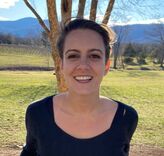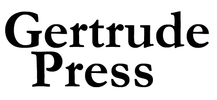I like being seen as a question, as something to learn more about. I like people that broadcast: you don’t know things about me yet. Would you like to find out? 
Grace Webb (they/she) is a sexuality educator and writer with a Master’s in English and Gender Studies from Columbia University. Their academic work has focused on queer theory and science fiction, and they live in New York. Connect on Twitter.
|
The park air outside the concert venue’s fence is heavy with dusk and the warped notes of electric guitar. I’m on maybe a third date, falafel remnants and bodega wine spread out across our blanket. They’re sitting in my lap, their legs draped across mine, their arms around my neck, holding on. I have never sat like this in my life. They’re bigger than me, there’s some rearranging of limbs. I enjoy feeling into this new form, flex my legs experimentally. I sink into this haze of music, this person with their face close to mine and their curls thick on my shoulder. I like to imagine how we appear to those around us. You know some things by looking at us—we are close, we like each other, this is intimacy—but you don’t know everything.
Attraction here is an exploration and a conversation: taking things that used to have set, certain meanings and power, and scrambling them, trying them on, feeling into difference. I like being seen as a question, as something to learn more about. I like people that broadcast: you don’t know things about me yet. Would you like to find out? And I like having permission to ask these things about myself, knowing that there’s no set answer on the other side of the question. I have never felt motivated by a sense of destination or clarity on the other side of any gender shifts and questions. Instead, discomfort pushed me out of a stable sense of self and into a different kind of confusion and unease. A space where body parts and mannerisms and clothing and feelings never quite cohere. I mostly don’t want a fully legible gender; I enjoy the spaces in between, the gaps in meaning, the silence where a word should be. But I have been surprised by how much I continue to mourn the loss of safety, belonging, and comfort that being legible to the rest of the world as a woman had offered me. I remember what I looked and felt like “before,” and sometimes the mirror warps and I can see this self again. There is a smoothness about her, a simplicity and ease. This kind of femininity gets coded as so natural that I feel sometimes as though the steps I’ve taken towards a different understanding of myself might never feel as real or authentic. I still look at my body with the eyes of others, with the old beauty standards I used to hold, and I feel unmoored and unfamiliar seeing myself in a muscle tank with cropped hair. A deep grief comes with letting go of being so easily understandable to my family, to men, to a whole world. Less legible as daughter, as cousin, as wanting preset life options. As being wanted by others in a certain way. For a long time I only took small steps out of this world by seeing beauty in other gender nonconforming people, not yet in myself. I was surprised to feel longing and attraction on New York sidewalks, to find it in people who didn’t look how I had been taught people were “supposed” to look. I found beauty in baldness, in tattoos, in ears weighed down by piercings, in thick bodies, in gender nonconforming and trans bodies. It felt like eyes widening, being able to think: beautiful, brave. I noticed how my thoughts about someone I’m not supposed to find beautiful were tangled up in my thoughts about my own beauty: this person must have such a strong sense of self, I would think. They must know that there is so much love outside of white straight beauty standards. Things I want to know and feel for myself, that I imagined they must. I am learning, or hoping, that there is a kind of abundance in trans aesthetics. A kind of knowledge or even faith that someone will find you beautiful as you move away from a presentation that was maybe more palatable to the rest of the world but not necessarily more true. Or maybe a knowledge that there are more important things than being seen as desirable to a specific set of people. Beauty means: worth looking at. And this can have multiplicity, multiple forms. Beauty as illegibility, curiosity. Which is to say, there is something political in trans aesthetics that is tangled up with and beyond a politics of beauty that is always racialized and gendered and normalized. In the bath under candlelight I look at my legs, wet hairs sticking to my skin like a dark wood grain. I flex my foot, pretend it’s not mine, that it’s someone else’s. My legs look strong, maybe masculine. But I feel a jolt when I reconnect them to the rest of my body. I don’t know if I like them as part of my body. I’ve never had a view of my body that was fully my own, and even as this feels like dispossession it feels also like giving up on the idea of ownership. My body was always a stranger to me; I’m just able to recognize it now. And if I find illegibility beautiful in others, I’m also trying to see this in myself, to be content with my own body feeling strange, to be content with lines not cohering into one meaning. To see it all as maybe something different than beautiful but still desirable—and desirable for this reason. I want to be desired because you can’t know everything about me by looking. I want others to want me not for stability but for undoing, for the care that is present in illegibility—the deeper care of not knowing, of letting someone tell you about themselves, of potential that you have to ask about. I’m trying to move away from a world of legibility, with the privilege and safety it brings, and into a world of being unknowable except as myself, or as deeply knowable but only by asking, not by looking. |
